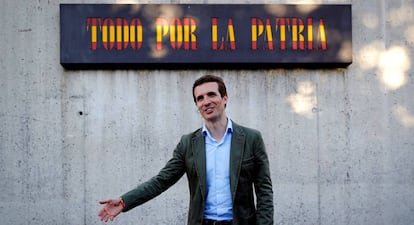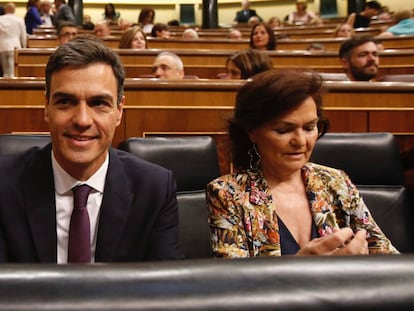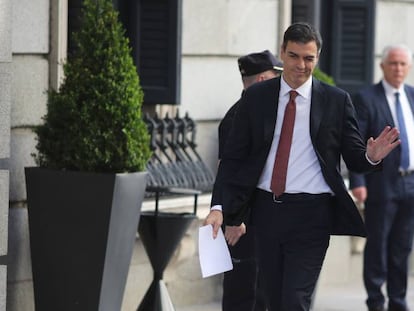Spain’s new Popular Party leader promises a shift to the right
Pablo Casado supports more restrictive abortion legislation, and reforms to election laws

Pablo Casado, 37, became the new president of Spain’s Popular Party (PP) at party primaries held on Saturday in Madrid. Casado defeated his rival, Soraya Sáenz de Santamaría, by a difference of 451 votes out of a total of 2,973 ballots, attracting the support of 57.2% of voters.
His victory heralds a shift further to the right by Spain’s main conservative party. Casado campaigned in favor of reintroducing more restrictive abortion legislation, toughening up the criminal code’s response to secessionist attempts, and reforming election laws “to stop depending on nationalists and minority parties.”
The leadership battle has revealed internal divisions within the PP
“People are expecting a liberal, conservative reform agenda from us,” said Casado on Esradio. “I am committed to this, and we will carry it through. The PP is back.”
The new PP leader wants to hold a special convention to review the party’s values and reaffirm its ideology. In an interview with EL PAÍS, Casado said that “we have to be everything to the right of the Socialist Party (PSOE).”
Casado is taking over from Mariano Rajoy, the former prime minister who was recently ousted in a no-confidence vote in Congress. The motion was headed by PSOE leader Pedro Sánchez, who became the new head of government on June 1 and said that he intends to serve out the remainder of the term until 2020.
But the PSOE will not be the only rival to beat at the next election. Voter intention polls have been showing eroding support for the PP, many of whose traditional supporters now say they prefer the younger liberal party Ciudadanos.
New contract with Spain
In his first speech as PP president, Casado talked about “a new contract with Spain,” and “unashamedly” defended conservative policies on “life and family.” He defended going back to 1985 abortion legislation that made pregnancy termination illegal with very few exceptions. In 2010, a Socialist government introduced a new law allowing terminations on demand up to the 14th week of pregnancy, in line with many EU countries.
People are expecting a liberal, conservative reform agenda from us
PP President Pablo Casado
Casado also suggested adding stability to Spanish politics by incorporating elements of Greece’s electoral system, which gives bonus seats to the winner of an election. This, said Casado, would prevent situations where minority governments have to rely on regional nationalists to push legislation through.
In a radio interview on Cope station, he said that he wants to send out an “unequivocal” message that the PP will battle the independence movement in Catalonia. One of Casado’s campaign proposals was to outlaw pro-independence parties altogether to avoid future breakaway bids.
No extra points for women
Casado also rejected the idea that being a female candidate should deserve special credit. Supporters of Santamaría, who served as deputy PM under Rajoy, had underscored this point during the campaign. “To deny that seeing a woman preside the party, and the government, would be an extraordinary achievement for our country, is to deny reality,” had said Borja Semper, the PP spokesman in the Basque parliament.
Casado wants to outlaw pro-independence parties to avoid future breakaway bids
The rift displayed during the leadership battle highlighted the fact that the PP is no longer the monolithic bloc it once was. Santamaría had party heavyweights among her backers, including Javier Arenas, a former minister and party leader in Andalusia. While Casado’s long-term goal is to catch up with Socialist PM Pedro Sánchez in time for the 2020 elections, his immediate task will be to patch up internal divisions within the party.
The new party leader served as chief of staff under former PM José María Aznar between 2009 and 2012, and as deputy communications secretary for Rajoy. He joined politics as president of the party’s youth group, Nuevas Generaciones (New Generations).
In April of this year, Casado was involved in a scandal over educational achievements that brought down the regional premier of Madrid, Cristina Cifuentes. He is being investigated in connection with a law degree he obtained from King Juan Carlos University.
English version by Susana Urra.









































